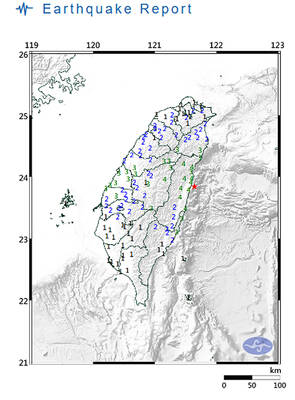Environmental groups yesterday called for stricter standards for environmental impact assessments (EIAs), saying that loosening requirements for solar projects could damage the environment.
The Ministry of Environment yesterday discussed draft amendments to the Standards for Determining Specific Items and Scope of Environmental Impact Assessments for Development Activities (開發行為應實施環境影響評估細目及範圍認定標準), with a focus on the assessment standards for photovoltaic development on hillsides and in environmentally sensitive areas, such as wetlands, intertidal zones, nature reserves and state plantations.
Environmental groups and the Government Watch Alliance held a news conference in front of the ministry before the discussion, saying that current standards lack an awareness of conservation and that EIAs are necessary.

Photo: CNA
The ministry should conduct at least four public hearings around Taiwan to reach a consensus among stakeholders, Government Watch Alliance spokesperson Chen Jiau-hua (陳椒華) said.
The draft amendments state that photovoltaic development projects covering an area less than 15 hectares would be exempted from EIAs and do not stipulate that a developer cannot apply for development permits under different company names, she said, adding that it would result in developers splitting the land into smaller pieces to evade EIAs.
The 15-hectare threshold is unreasonable, as pastures and campsites larger than 1 hectare are required to undergo assessments, City Forest Association, Taiwan chairman Chuang Chieh-jen (莊傑任) said.
Leopard Cat Association of Taiwan member Chen Chi-chung (陳祺忠) agreed that the threshold is not strict enough and suggested tightening assessment standards for photovoltaic development not only on hillsides, but also on non-urban land and regular agricultural districts.
Assessments should be mandatory for projects covering an area of 2 or more hectares on national or public land and land owned by state-owned or public companies, as these lands are currently exempted with approval from energy authorities, Chuang said.
Those covering less than 2 hectares should be exempted only if they are approved by forestry authorities — instead of energy authorities — to curb improper development of state plantations, he said, adding that it is unrealistic to expect energy authorities to impose tight controls.
Photovoltaic development in intertidal zones should be subject to EIAs regardless of scale, as most are important habitats for birds, Changhua Environmental Protection Union representative Jenny Wu (吳慧君) said.
The number of endangered bird species inhabiting the coastal wetlands in Changhua County dropped from 23 in 2019 to 12 in 2021, after a wind power development began in 2019 without doing EIAs and installed 14 turbines within 2.5km, she said.
The ministry would discuss whether to impose EIAs on smaller scale projects and those in intertidal zones, Department of Environmental Protection Director-General Tsai Meng-yu (蔡孟裕) said.
Photovoltaic development do not cause air and water pollution, and the amendments aim to resolve EIA-related issues based on regulations in other countries, he said, adding that developments covering an area less than 40 hectares are exempted in Japan.
Additional reporting by CNA

A small number of Taiwanese this year lost their citizenship rights after traveling in China and obtaining a one-time Chinese passport to cross the border into Russia, a source said today. The people signed up through Chinese travel agencies for tours of neighboring Russia with companies claiming they could obtain Russian visas and fast-track border clearance, the source said on condition of anonymity. The travelers were actually issued one-time-use Chinese passports, they said. Taiwanese are prohibited from holding a Chinese passport or household registration. If found to have a Chinese ID, they may lose their resident status under Article 9-1

Taiwanese were praised for their composure after a video filmed by Taiwanese tourists capturing the moment a magnitude 7.5 earthquake struck Japan’s Aomori Prefecture went viral on social media. The video shows a hotel room shaking violently amid Monday’s quake, with objects falling to the ground. Two Taiwanese began filming with their mobile phones, while two others held the sides of a TV to prevent it from falling. When the shaking stopped, the pair calmly took down the TV and laid it flat on a tatami mat, the video shows. The video also captured the group talking about the safety of their companions bathing

PROBLEMATIC APP: Citing more than 1,000 fraud cases, the government is taking the app down for a year, but opposition voices are calling it censorship Chinese Nationalist Party (KMT) Chairwoman Cheng Li-wun (鄭麗文) yesterday decried a government plan to suspend access to Chinese social media platform Xiaohongshu (小紅書) for one year as censorship, while the Presidential Office backed the plan. The Ministry of the Interior on Thursday cited security risks and accusations that the Instagram-like app, known as Rednote in English, had figured in more than 1,700 fraud cases since last year. The company, which has about 3 million users in Taiwan, has not yet responded to requests for comment. “Many people online are already asking ‘How to climb over the firewall to access Xiaohongshu,’” Cheng posted on

A magnitude 5.7 earthquake yesterday struck off the coast of Hualien, causing brief transportation disruptions in northern and eastern Taiwan, as authorities said that aftershocks of magnitude 5 or higher could occur over the next three days. The quake, which hit at 7:24pm at a depth of 24.5km, registered an intensity of 4 in Hualien and Nantou counties, the Central Weather Administration (CWA) said. There were no immediate reports of damage or injuries. In Taipei, the MRT railway’s operations control center received an earthquake alert and initiated standard safety procedures, briefly halting trains on the Bannan (blue) line for about a minute.